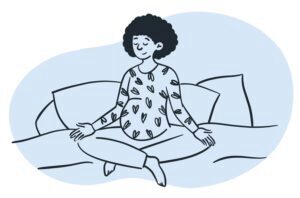Sleep and Your Hormones: What's the Link?
Disclosure: By clicking on the product links in this article, Mattress Nerd may receive a commission fee at no cost to you, the reader. Read full disclosure statement.
Quality sleep helps your body produce and regulate hormones. Conversely, poor sleep can lead to hormonal imbalances and increase your risk of certain health concerns.
Here’s everything you need to know about sleep and your hormones.
Bottom Line: How Do Hormones Affect your Sleep?
While you sleep, your body produces and regulates hormones that help control important functions like hunger, circadian rhythm, and immune response. If you don’t get enough quality sleep, your body can’t maintain proper hormone levels. As a result, you may get sick more often, have issues with blood sugar balance, or develop a slower metabolism.
How are Hormones and your Sleep Connected?
When you sleep, your body rejuvenates and repairs itself by producing and regulating essential hormones. Hormones are chemical messengers produced and secreted via the endocrine system—various glands in the body. Hormones help maintain vital functions like:
- sexual wellness
- circadian rhythm
- sleep-wake cycle
- body temperature
- appetite and hunger
- cardiovascular health
- blood sugar regulation
- tissue and muscle repair
Poor sleep and sleep deprivation can alter your hormone levels, inhibit hormone production, and affect the ways hormones interact with each other. Hormonal imbalances can increase your risk of certain health concerns including thyroid disease, metabolic syndrome, sleep disorders, and sexual dysfunction.
The Main Hormones that Sleep Impacts
Here’s a rundown of the main hormones that sleep impacts.
Melatonin
Melatonin is produced by the pineal gland, which is in your brain. It’s often referred to as “the sleep hormone” because it plays a major role in sleep regulation. Melatonin production is triggered by darkness. That means light can pause production, making it harder for you to fall asleep.
Melatonin helps regulate your circadian rhythm, a natural internal process that controls your sleep-wake cycle. Research show it also helps your body transition into a restful state and promotes quality sleep.
Cortisol
Cortisol is produced by the hypothalamic pituitary adrenal (HPA) axis. This complex network is involved in your body’s stress response and includes the pituitary gland, adrenal glands, and hypothalamus. Cortisol is also called a “stress hormone” and helps drive your fight-or-flight response. It also helps regulate:
- blood sugar
- energy levels
- blood pressure
- cardiac system function
Generally, cortisol levels are at their highest in the morning and their lowest around bedtime. When this rhythm is thrown out of sync, it can lead to increased anxiety and a poor night’s sleep. Over time, this may trigger a cycle of cortisol dysfunction and poor sleep.
Hunger Hormones
Low-quality sleep can have a major impact on hunger hormones in the body (e.g. leptin, insulin, and ghrelin). These hormones help regulate:
- hunger
- fullness
- fat storage
- metabolism
- blood sugar regulation
When you don’t get enough quality sleep, you might notice changes in your eating habits. According to a 2022 review, sleep deprivation can make you crave high-fat foods and carbs. If those snacks aren’t part of a balanced and nutritious diet, they can make it difficult to maintain a healthy body weight.
Additionally, hunger hormone imbalance can lead to insulin resistance and other conditions. Research shows that poor sleep is a risk factor for diabetes, metabolic syndrome, and obesity.
Growth Hormones
Sleep helps control the production of human growth hormone (HGH), aka somatotropin. While you snooze, your HGH levels increase—especially during deep sleep. HGH promotes:
- immunity
- metabolism
- protein synthesis
- protein production
- muscle development
Studies also show that growth hormones can have an impact on the regulation of lipids, proteins, and glucose in the body. When you don’t get enough sleep, your growth hormone levels can decrease. This can make it harder for your body to repair injuries and can also lead to weight gain. Additionally, research also links HGH deficiency to changes in body composition.
Thyroid Hormones
The thyroid is a small gland located at the front of your neck. It produces two hormones that tell your body how to use energy: Triiodothyronine and thyroxine. Folks with sleep disorders often have thyroid dysfunction, but the exact link is unclear.
Hypothyroidism is a condition marked by a decrease in these hormones. Studies show hypothyroidism can affect overall sleep quality in a variety of ways. The condition is known to cause excessive sleepiness, poor concentration, chronic fatigue, and prolonged periods of sleep. Additionally, hypothyroidism can cause muscle or joint pain that makes it difficult to fall asleep in the first place.
Hyperthyroidism is when your thyroid produces too much of these hormones. An overactive thyroid can make you feel irritable or anxious. This might make it difficult for you to drift off. Hyperthyroidism can also cause night sweats and chronic urination, which can wake you throughout the night.
Sex Hormones
Estrogen and testosterone are sex hormones everyone produces that help maintain reproductive and overall health. However, estrogen is often referred to as a “female” hormone while testosterone is called the “male” hormone. This can be misleading since all genders produce both.
Both sex hormones can affect sleep if they are too low. In addition to its crucial role in regulating the reproductive system, estrogen helps regulate neurotransmitters that affect the sleep-wake cycle. Low levels of estrogen can lead to night sweats, irritability, and poor sleep.
Testosterone production peaks when you sleep. According to a 2014 study, low levels of testosterone can affect overall sleep quality in men. This can trigger a problematic cycle. Basically, a lack of sleep can lower testosterone levels which can make it more difficult to get good sleep.
Sleep Deprivation and your Hormones
Getting enough sleep each night is very important for hormone production and regulation. Most adults need 7 to 9 hours of sleep a night, according to the Centers for Disease Control and Prevention (CDC).
Not getting enough sleep can lead to hormonal imbalances and related conditions like:
- weight gain
- sexual dysfunction
- more frequent illnesses or infections
- worsened immunity or overall health
- increased appetite and higher calorie consumption
Sleep quality is also important. Building up a large sleep debt during the week can’t be made up over the weekend. Additionally, a light nap probably won’t have the same benefits as a full rapid eye movement (REM) cycle sleep. So, try to get into a good groove and sleep during the same hours each night.
Oversleeping and your Hormones
Sleep is necessary for healthy hormone regulation. However, too much sleep may be a problem, too. Since hormones like cortisol increase as you sleep, oversleeping may elevate these hormone levels. As a result, you may experience more anxiety from high cortisol levels.
In a 2011 study, participants who slept more than 9 hours also had lower cognitive scores than participants who had 7 hours of sleep. Another study found that long sleep is associated with diabetes, hypertension, and obesity.
Additionally, too much sleep can cause symptoms like:
- fatigue
- grogginess
- impaired focus
- slower metabolism
- disrupted sleep cycles
Tips to Improve your Sleep
Here are some tips to help improve your sleep.
- Try not to nap. Naps can throw off your sleep schedule, making it harder to sleep at night.
- Dim the lights. Exposure to bright lights before bed can inhibit melatonin production. If your room gets a lot of natural light in the morning, you may want to buy blackout curtains or an eye mask.
- Keep it quiet. Some noises are out of your control, especially if you live in a populated area. You can try to drown these noises out with a white noise machine, fan, or nature sounds.
- Keep it cool. Studies show the optimal bedroom temperature is 65–70°F. This can keep you comfortable which might help you sleep better through the night.
- Be consistent. Try to go to bed and wake up at the same time every day, even on weekends. This can help regulate your sleep cycle and give you more waking energy.
- Turn your phone off. Avoid staring at screens before bed. Electronic devices emit blue light which can discourage melatonin production and keep you awake.
- Avoid certain foods. Try not to eat a large meal right before bed. This reduces your risk of an upset stomach, acid reflux, or indigestion.
- Limit caffeine. Try to avoid drinking caffeine at least 6 hours before you go to bed. Drinking too much caffeine—or having a cup of coffee later in the day—can make it difficult to fall and stay asleep.
- Invest in a good mattress. Sleeping on an uneven, lumpy, or sagging mattress can lower sleep quality. If you aren’t able to buy a new mattress right now, you can opt for a mattress topper. They’re cheaper and can make your bed a lot more comfortable.
When to Talk to a Doctor
You might want to talk with a doctor if you consistently have a hard time falling asleep or staying asleep. You may also want to talk to someone if you regularly feel fatigued or wake up groggy.
A sleep specialist might suggest that you make lifestyle changes or try relaxation techniques, like breathing exercises or meditation. Your doctor might also recommend prescription medications or talk therapy for sleep disorders like insomnia.
FAQs
How does sleep affect your hormones?
Lack of sleep can disrupt hormone levels because your body doesn’t have enough time to produce and regulate hormones—resulting in low levels of key hormones. Sleeping too much may make you overproduce hormones like cortisol—increasing anxiety and stress.
What hormone is affected by sleep?
Lack of sleep can affect levels of hormones like melatonin, cortisol, human growth hormone (HGH), leptin, and ghrelin.
How do I balance my hormones for sleep?
The best way to rebalance any hormone levels affected by sleep is to get plenty of quality sleep—ideally 7 to 9 hours each night. Since light affects melatonin levels, sleeping in a dark room and avoiding artificial light at night can also help.
Takeaway
Consistent, quality sleep is essential for hormone production and regulation. Not getting enough sleep (or sleeping too much) can lead to hormone imbalance. This can trigger a variety of health concerns like
Ideally, you should aim for 7 to 9 hours of sleep each night. This can help you maintain a consistent sleep cycle while promoting hormone health and general wellness.
Source List
- Barth C, et al. (2015). Sex hormones affect neurotransmitters and shape the adult female brain during hormonal transition periods. https://www.ncbi.nlm.nih.gov/pmc/articles/PMC4335177/
- Ferrie JE, et al. (2011). Change in sleep duration and cognitive function: Findings from the Whitehall II study. https://www.ncbi.nlm.nih.gov/pmc/articles/PMC3079935/
- Green ME, et al. (2021). Thyroid dysfunction and sleep disorders. https://www.ncbi.nlm.nih.gov/pmc/articles/PMC8423342/
- Harding EC, et al. (2019). The temperature dependence of sleep. https://www.ncbi.nlm.nih.gov/pmc/articles/PMC6491889/
- How much sleep do I need? (2022). https://www.cdc.gov/sleep/about_sleep/how_much_sleep.html
- Kim BO, et al. (2020). Assessment of the relationship between knee ultrasound and clinical symptoms in patients with thyroid dysfunction. https://www.ncbi.nlm.nih.gov/pmc/articles/PMC7113714
- Kim TW, Jeong JH, Hong SC. (2015). The impact of sleep and circadian disturbance on hormones and metabolism. https://www.ncbi.nlm.nih.gov/pmc/articles/PMC4377487/
- Leproult R, et al. (2011). Effect of 1 week of sleep restriction on testosterone levels in young healthy men. https://www.ncbi.nlm.nih.gov/pmc/articles/PMC4445839/
- Léger V, et al. The risks of sleeping “too much.” Survey of a national representative sample of 24671 adults (INPES health barometer). https://www.ncbi.nlm.nih.gov/pmc/articles/PMC4165901/
- Mosavat M, et al. (2021). The role of sleep curtailment on leptin levels in obesity and diabetes mellitus. https://www.karger.com/Article/FullText/514095
- Papatriantafyllou E, et al. (2022). Sleep deprivation: Effects on weight loss and weight loss maintenance. https://www.ncbi.nlm.nih.gov/pmc/articles/PMC9031614/
- Ranke MC, et al. (2018). Growth hormone — past, present and future. https://www.nature.com/articles/nrendo.2018.22
- Savage RA, et al. (2023). Melatonin. https://www.ncbi.nlm.nih.gov/books/NBK534823/
- Shahid MA, et al. (2023). Physiology, thyroid hormone. https://www.ncbi.nlm.nih.gov/books/NBK500006/
- Sperling, MA. (2016). Traditional and novel aspects of the metabolic actions of growth hormone. https://www.sciencedirect.com/science/article/abs/pii/S1096637415300071
- Stephens, MA. (2012). Stress and the HPA axis. https://www.ncbi.nlm.nih.gov/pmc/articles/PMC3860380/
- Symptoms – Overactive thyroid (hyperthyroidism). (2019). https://www.nhs.uk/conditions/overactive-thyroid-hyperthyroidism/symptoms/
- Thau L, et al. (2022). Physiology, cortisol. https://www.ncbi.nlm.nih.gov/books/NBK538239/
- Wittert, G. (2014). The relationship between sleep disorders and testosterone in men. https://www.ncbi.nlm.nih.gov/pmc/articles/PMC3955336/


